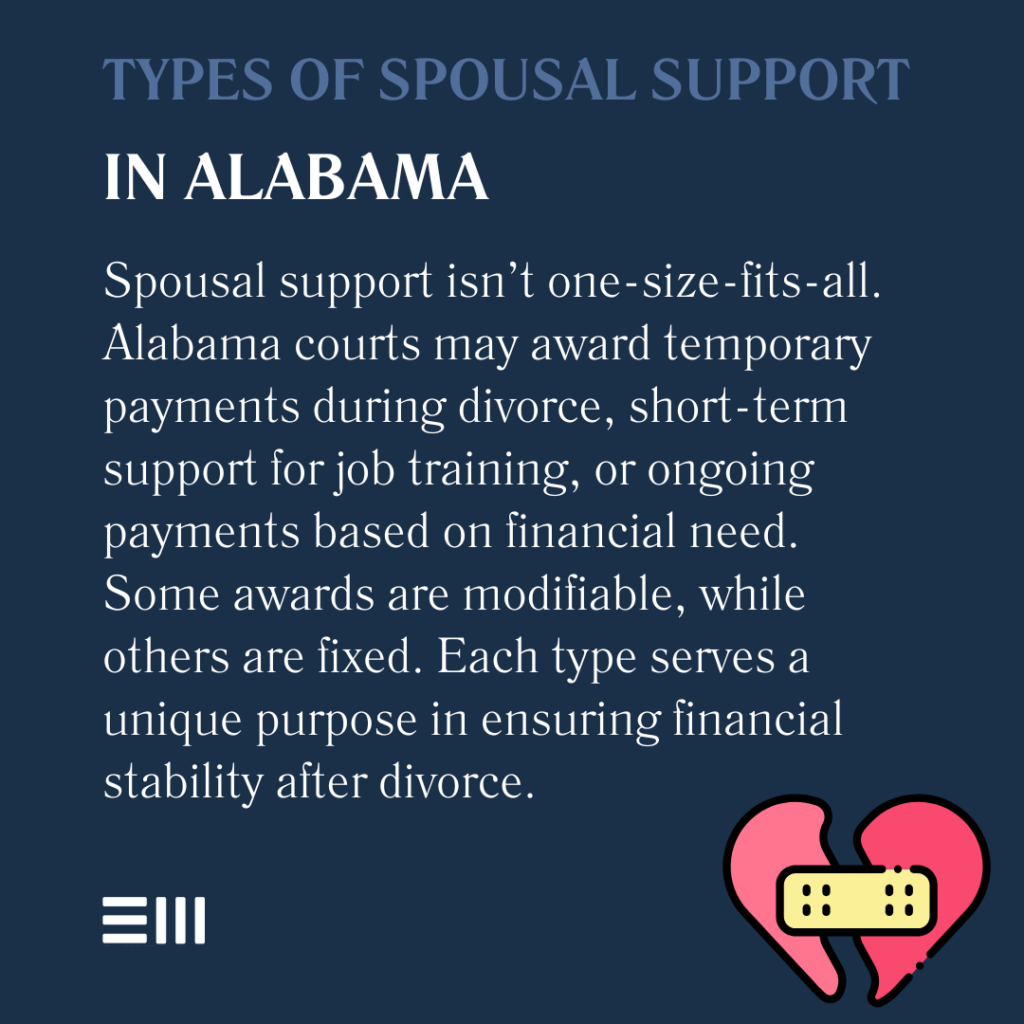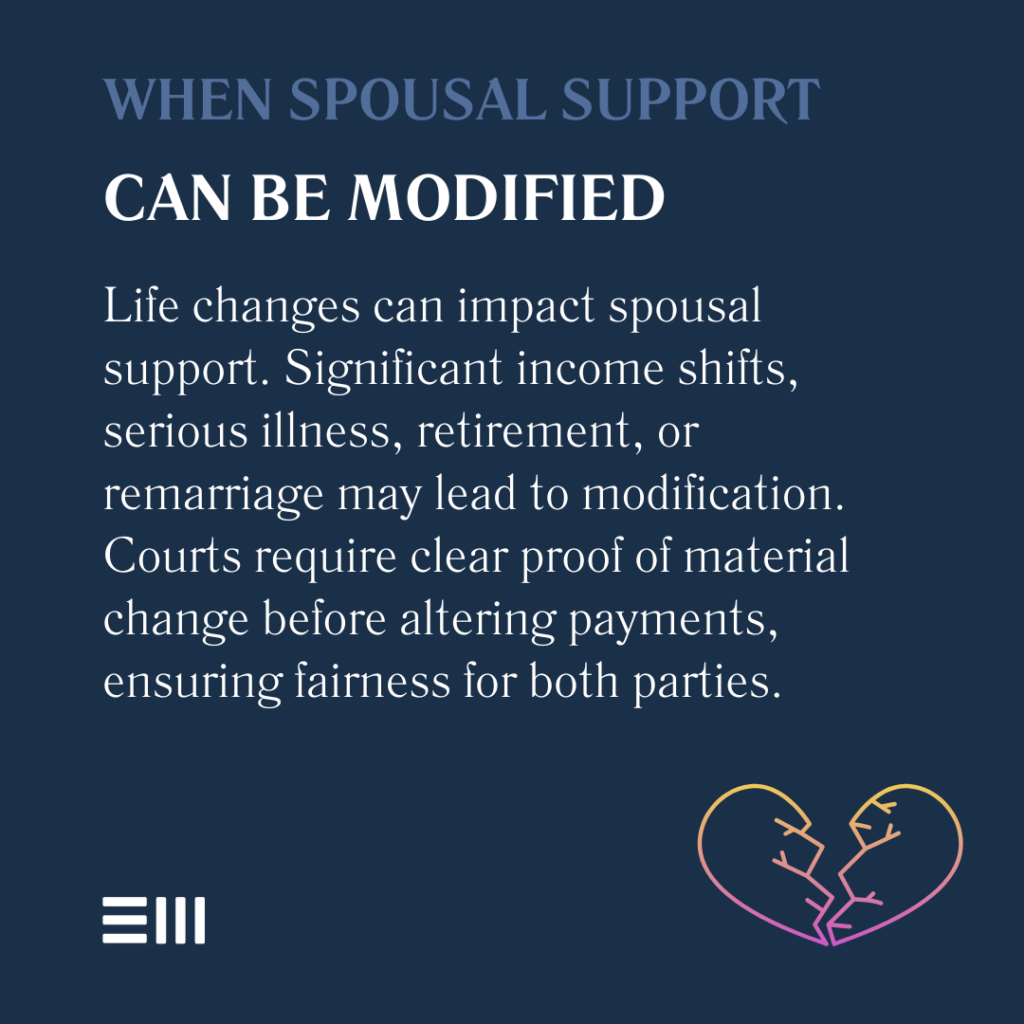
Behind every divorce lies a story of changing financial realities. A spouse who stepped back from their career to raise children now faces re-entering the workforce.
A partner who supported their spouse through graduate school confronts an uncertain economic future.
These scenarios unfold daily across Alabama, where spousal support laws aim to create fair transitions from married to single life. Understanding these laws helps you navigate one of life’s most challenging financial transitions with confidence.
Understanding Spousal Support in Alabama
Alabama courts consider multiple factors when determining spousal support, also known as alimony.
The state recognizes that divorce can create significant financial disparities between spouses, particularly when one partner has sacrificed career opportunities for family responsibilities.
Types of Spousal Support Available
Before exploring specific types of support, it’s important to understand that Alabama law provides several options to address different post-divorce scenarios and needs.
- Interim Support: Temporary financial assistance during divorce proceedings.
- Periodic Alimony: Ongoing payments with no set end date, modifiable based on circumstances.
- Rehabilitative Alimony: Short-term support allowing the recipient to gain education or job skills.
- Lump Sum Alimony: One-time payment, typically non-modifiable.
- Alimony in Gross: Fixed total amount paid in installments.
Each type of support serves distinct purposes in helping maintain financial stability after divorce.

Factors Courts Consider
Alabama judges evaluate numerous elements when determining spousal support awards.
Understanding these factors helps create realistic expectations about potential outcomes.
- Length of marriage;
- Standard of living established during marriage;
- Age and health of both parties;
- Earning capacity and education levels;
- Contributions to the marriage, including homemaking;
- Property division in the divorce;
- Child custody arrangements;
- Tax consequences;
- Sources of income;
- Job market conditions; and
- Time needed for education or training.
These considerations help courts craft fair and appropriate support arrangements.
Duration and Modification of Support
Support arrangements in Alabama aren’t necessarily permanent. Several circumstances can affect the length and terms of payments.
Length of Payments
The duration of spousal support typically relates to specific circumstances:
- Short-term marriages (under 7 years): Support often limited to 1-3 years.
- Medium-length marriages (7-20 years): Support may last 3-10 years.
- Long-term marriages (over 20 years): Support could be permanent.
- Rehabilitative support: Usually limited to time needed for education/training.
- Retirement age: May affect payment duration.
Understanding these timeframes helps both parties plan for their financial future.
Modification Circumstances
Life changes can warrant adjustments to Alabama child support arrangements.
Common situations include:
- Significant income changes;
- Serious illness or disability;
- Retirement;
- Remarriage of recipient;
- Cohabitation of recipient;
- Job loss or career changes; and
- Substantial inheritance.
Courts require clear evidence of material change before modifying existing orders.

Tax Implications and Financial Planning
Recent tax law changes have significantly impacted how spousal support affects both parties’ finances.
Current Tax Treatment
Understanding the tax implications helps both parties make informed decisions:
- Payments no longer tax-deductible for payer;
- Recipients don’t report payments as income;
- Modified pre-2019 agreements may follow old rules;
- State tax treatment may differ; and
- Property transfers remain tax-free.
These considerations affect negotiation strategies and long-term financial planning.
Frequently Asked Questions About Spousal Support in Alabama
Many individuals facing divorce have common concerns about spousal support in Alabama.
Here are answers to the most pressing questions we receive.
How Is the Amount of Spousal Support Calculated in Alabama?
Unlike child support, Alabama has no standardized formula for calculating spousal support. Courts consider multiple factors, including income disparity, length of marriage, and standard of living.
What Happens if Support Payments Are Missed?
Courts treat missed payments seriously, offering several enforcement options including wage garnishment, property liens, and contempt proceedings.
Can Spousal Support Be Terminated Early?
Certain circumstances like remarriage or cohabitation can end support obligations. However, termination isn’t automatic and usually requires court action.
Do I Need an Attorney to Modify Support?
While not legally required, professional representation significantly improves the chances of successful modification given complex legal requirements.
How Does Retirement Affect Spousal Support?
Retirement can constitute grounds for modification, but courts examine whether retirement is reasonable and made in good faith.
Enforcement and Compliance
Understanding the enforcement mechanisms for spousal support helps both parties maintain their obligations and rights under Alabama law.
Documentation and Record Keeping
Maintaining accurate records is essential for both parties in a spousal support arrangement:
- Keep detailed payment records including dates, amounts, and methods;
- Document all communication about support;
- Save bank statements and canceled checks;
- Maintain copies of all court orders;
- Record any agreed modifications in writing; and
- Track relevant life changes affecting support.
These records protect both parties and facilitate resolution of any disputes.
Legal Enforcement Options
When support orders are violated, Alabama courts provide several enforcement mechanisms:
- Income withholding orders;
- Property liens;
- License suspension;
- Contempt of court proceedings;
- Judgment collection methods; and
- Federal tax refund intercepts.
Understanding these options helps ensure compliance and proper handling of payment issues.
Take Control of Your Future Today
Our experienced family law attorneys understand the complexities of Alabama spousal support laws.
Every case deserves personalized attention and strategic planning.
Contact Baxley Maniscalco now for a confidential consultation. Let us help protect your financial future and secure the support arrangement you deserve.
Can't find what you're looking for? Search our site below.










